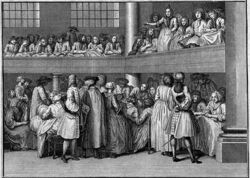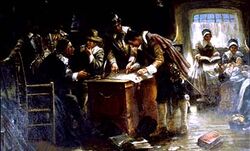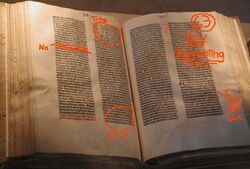Church of God the Wholly Incompetent
The Church of God the Wholly Incompetent is a Christian church based mainly in North America and Western Europe. Adherents believe God is omnipotent but generally unqualified for His role as deity, citing the Great Flood, the Roman Empire and their own personal failings as proof. Worldwide membership was 30.5 million in 2006.
If you masturbate, God kills you. It says so in the bible.
The sect has been controversial since its foundation, and faced persecution in several countries for its allegedly heterodox views. The church (whose followers are known as "compies") believes in a "fractured Trinity", holding that Jesus is the Son of God but "got in over his head" when he let himself die on the cross. Compies deny the resurrection, arguing that Jesus is still knocking around somewhere below the Church of the Holy Sepulchre, a victim of God's omniuselessness. Where other sects revere Early Christian martyrs as witnesses of Christ's message, the Wholly Incompetent Church believes their deaths are a prime example of God's fumbling, bumbling ways.
Church membership is dominated by actors, professors, oil company executives, journalists and other people who believe they can "do it better."
History
Foundation
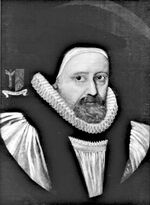
The Church was founded by Sidney Trammell, an Oxford divinity student, in 1612. Trammell, the youngest son of a minor noble from Kent, had shown great promise as a student, mastering Greek and Latin by the age of three. At age eight, he completed his first theological work, On Whether the Pope Should Be Burn'd in a Great Fyre or Stabb'd, Stuffed With Straw and Displayed Before Bear-Baytings. An Oxford faculty member said Trammell "show'd the sayme adherence to truth as Wycliffe," and another predicted he would become Archbishop of Canterbury.
Trammell was a passionate devotee of the Anglican Church. When Baptist preacher Edward Wightman was burned at the stake on April 11, 1612, Trammell organized a celebration nearby, widely regarded as the world's first tailgate party. Four days later, Trammell had what he described as a "Road to Damascus" conversion.
On April 15, Trammell arose at 5 a.m. to begin his studies. Suffering from a headache, he found he could not concentrate and decided to walk the grounds. While outside, a group of drunken frat members, claiming he was "only a moderately pious curate," threw eggs at him and chased him around the school. No sooner had Trammell lost his pursuers than he ran into his fiancee, who dumped him for Sir Walter Raleigh, saying "a prisoner about to lose his head is more lively than you." Dejected, Trammell returned home, to find that neighborhood children had taken his Greek grammar and used it as a football.
Attending mass that morning, Trammell prayed for guidance. As the service began the presiding bishop announced, "This is the day the Lord has made; let us rejoice and be glad." As Trammell later wrote in His Many Faults, or How I Learned to Sleape at Nyte:
- The words pierc'd my care-worn heart and seem'd to restore balance to my soul. I rose, and shout'd "You speaketh the truth, bishop, for a daye like this could only stem from a God wholly out of His depth. But do not rejoice, for He is yet an unmeritable God." They stood stunn'd, amayz'd by this.
Growth and Early Persecution
Trammell was forced to leave Oxford the next day. Making his way to London, he began preaching and writing his first major work, Prayers to Almighty God, With Helpfull Suggestions For His Improvement (1613). Although Trammell did not expect his new sect to be popular, he quickly converted all of London's lawyers and was able to purchase a meeting house, which drew a large crowd of people eager to bring the Supreme Being down a peg.
Authorities soon learned about the church, and Trammell was summoned before George Abbot, the Archbishop of Canterbury, to defend his beliefs. Abbott accused Trammell of denying God's omnipotence. "Nay," Trammell replied, "I merely deny His fitness to be in charge of the universe." Shocked, Abbott ordered him to recant, but Trammell replied "Here I stand. I can not do otherwise. Keep your distance, God, because I know you'll screw it up. Amen."
A sustained persecution began, with many Compies dying for their beliefs. Warned on the scaffold that he risked hellfire, Henry Carver, Trammell's foremost disciple and the discoverer of the fabled Ten General Commandments of All Humanity, replied "It matters not; God hath no clue what He is doing." Trammell escaped with most of his followers to Holland, writing that he did not fear God's anger, as incurring a bumbling deity's wrath could be tolerable, and even amusing.
Immigration and subsequent history
Trammell attracted more followers in Amsterdam and continued writing, his works smuggled into England by faithful Compie followers. Trammell wrote furiously, and published Synners in the Hands of a Idle God (1622), Meditations on a Dysfunctional Trinity (1623) and On Living With a Confused God (1625). Trammell was condemned in absentia in England and sentenced to death; the preacher wrote that he would resign himself "to whatever destiny the Lord plans for me, or whatever emerges from His unorganized mind."
Compies began migrating to America in 1635, attracted to Roger Williams' promise of religious toleration. After Williams published The Bloudy Tenent of Persecution, for Cause of Conscience, Trammell praised him in a letter, saying:
- Yea, fore we hath known that each man must follow his consience; and that no man may be bounde justly to one religion. Fore truly, a God with such a consystent record of failure can not be trusted to establish a single church on Earth.
Trammell died in Amsterdam in 1653. The church proselytized throughout Europe and North America, and continues to do so today.
Beliefs
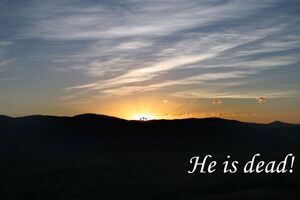
The Church of God the Wholly Incompetent shares some of the same teachings of the Church of England, with a few significant modifications. Accepting the trinitarian view of the creator, Compies believe Jesus is the Son of God but insist that he died on the Cross and never rose again. The Church teaches that God could conceivably resurrect His son, but has not or has badly bungled this part of salvation. Accordingly, Compies reject traditional interpretations of the New Testament resurrection narratives, saying God accidentally raised a guy next door.
This belief colors the Compie perception of the afterlife. The Church holds that neither faith nor good works lead to salvation. The Church accepts predestination, but believes that with Jesus' intercession absent, God has "seriously messed up" the list, meaning people go to heaven or hell through sheer chance. By this formula, Lenin, Spinoza, Elvis and Ivan the Terrible are in paradise, while Mother Theresa, Florence Nightingale, your grandmother and Hildegard von Bingen burn in hell. Despite this dire scenario, Compies take comfort in the fact they have a 50/50 chance of making it to heaven.
Compies believe God has always been incompetent, although this proposition was fiercely debated in the Church's early years. Nicolaus Stuart, a young Compie preacher from Rosslyn, Scotland, taught that God has only been incompetent since Jesus died (from a fall in the bathtub) and that his resurrection would, in theory, "bring our Almighty up to speed". Founder Trammell and other hardline Church members condemned this teaching at a synod in 1630, holding that "our God was, is, and forevermore shall be in over His head." Stuart later led his followers out of the Church, and joined the Unitarians.
Practices
Compies strongly believe in individual conscience and the right of every person to find God's screw-ups in their own way. The church encourages members to study the Bible for evidence of God's mistakes. Compies have gained a considerable reputation for their understanding of the Old and New Testaments, although many theologians are uneasy with Compie theology and its grounding in relentless bitching.
Compie masses deviate from standard Christian services. The Bible is read near the beginning of Mass, but instead of a sermon, individual Church members rise and critique the actions of biblical characters. "This is where Amos lost it" and "Here's who Jesus should have healed" are common statements in a Compie Mass.
Communion is also different. Compies consider the sacrament important but reject consubstantiation and transubstantiation. During the blessing, the priest raises bread and wine and repeats the words of Jesus at the Last Supper. Afterward, the priest kneels, rises and begins shouting at the Eucharist:
- Hello? HELLLOOOOOO??!! Can you hear me, Jesus? HELLLOOOOOO????? (Knocks on the chalice) Knock back if you hear me. (Places ear on chalice) Not a word. Well, looks like God screwed up the presence of His son in the Eucharist. Who's surprised?
Criticism
Since its founding, the Church of God the Wholly Incompetent has been derided for allegedly making a mockery of God. John Milton wrote 62 pamphlets attacking their errors, and conceived Paradise Lost as a long litany of tortures for Trammell to endure. Others argue that Compies can not believe in a God both omnipotent and klutzy, arguing that an omnipotent being would necessarily be perfect in thoughts and actions. Trammell defended his belief in Synners in the Hands of a Idle God, using numerous biblical citations claiming that God "could have done it better." Trammell was especially critical of God's handling of King Ahab, writing that "I woulde have struck him down at the first sighte of Jezebel."
The church has also aroused criticism from outsiders, who wonder why Compies would worship a god they hold in contempt. Compies reply that God is the only God in the universe, and needs all the encouragement He can get.
Religious Texts
During its early years, Sidney Trammell wrote a great deal of texts on his burgeoning faith, many of which are now regarded as divine canon by the Church. The texts are listed below:
- The Holy Bible (Old and New Testaments, excluding the Epistle of Jude and Apocalypse of John; now includes Visions of Iddo the Seer, Book of Armaments, Gospel of Peter, and Third Epistle to the Thessalonians)
- On Whether the Pope Should Be Burn'd in a Great Fyre or Stabb'd, Stuffed With Straw and Displayed Before Bear-Baytings (1582)
- The Life and Tymes of Sainte John the Fishermann, as Tolde by Mister Clayepoole (1589)
- On the Subjecte of the Almighty (1609)
- Prayers to Almighty God, With Helpfull Suggestions For His Improvement (1613)
- His Many Faults, or How I Learned to Sleape at Nyte (1617)
- On Why the Worlde Turns (1620)
- Synners in the Hands of an Idle God (1622)
- Meditations on a Dysfunctional Trinity (1623)
- On Living With a Confused God (1625)
- Against All Heresies (1630)
- By God’s Waning Light (1636)
- Heaven’s Lampost Laid Waste, or Christ’s Kingdom Undone (1641)
- Yet Unmeritable (1648)
- The Day the Lord Made (1652)
- Between Myself and the Powers of Darkness (1653)
| Featured version: 30 October 2006 | |
| This article has been featured on the main page. — You can vote for or nominate your favourite articles at Uncyclopedia:VFH. | |


